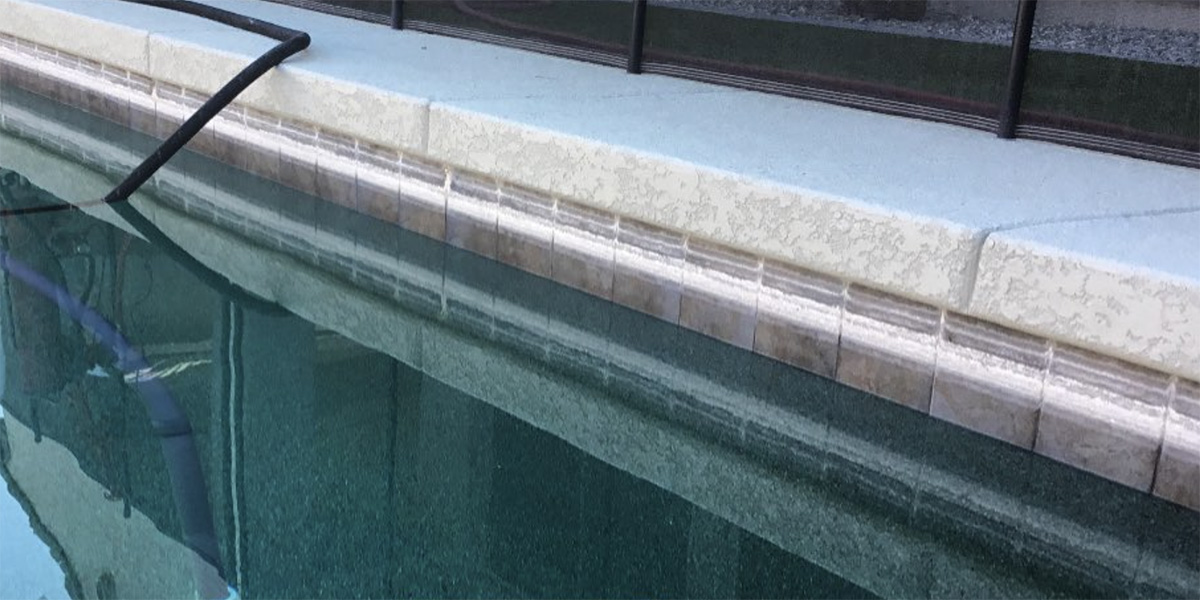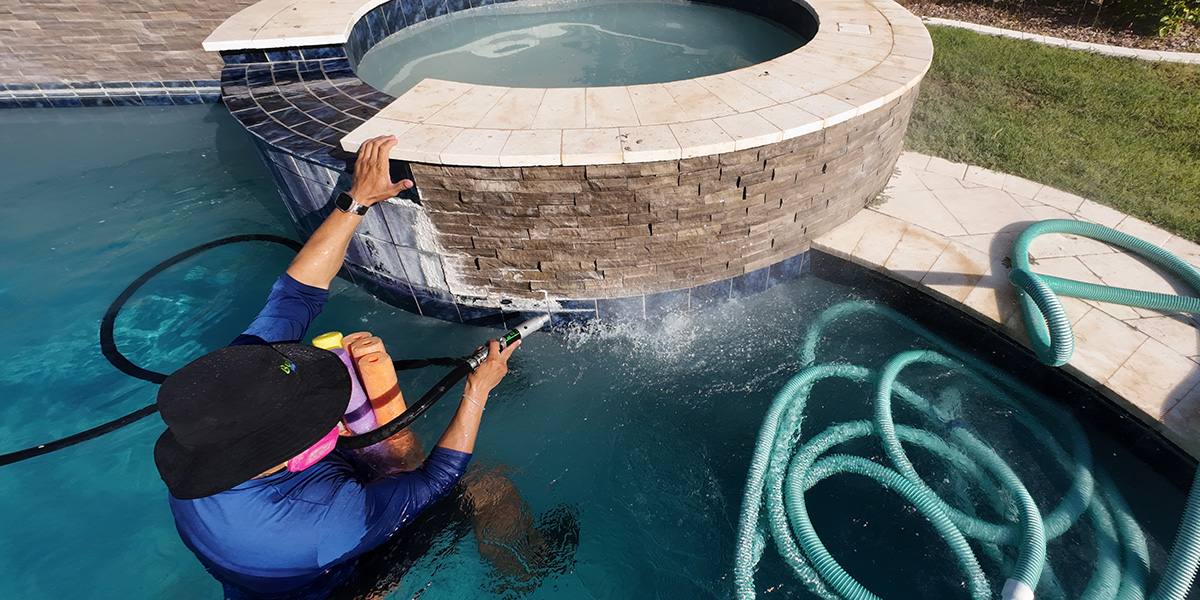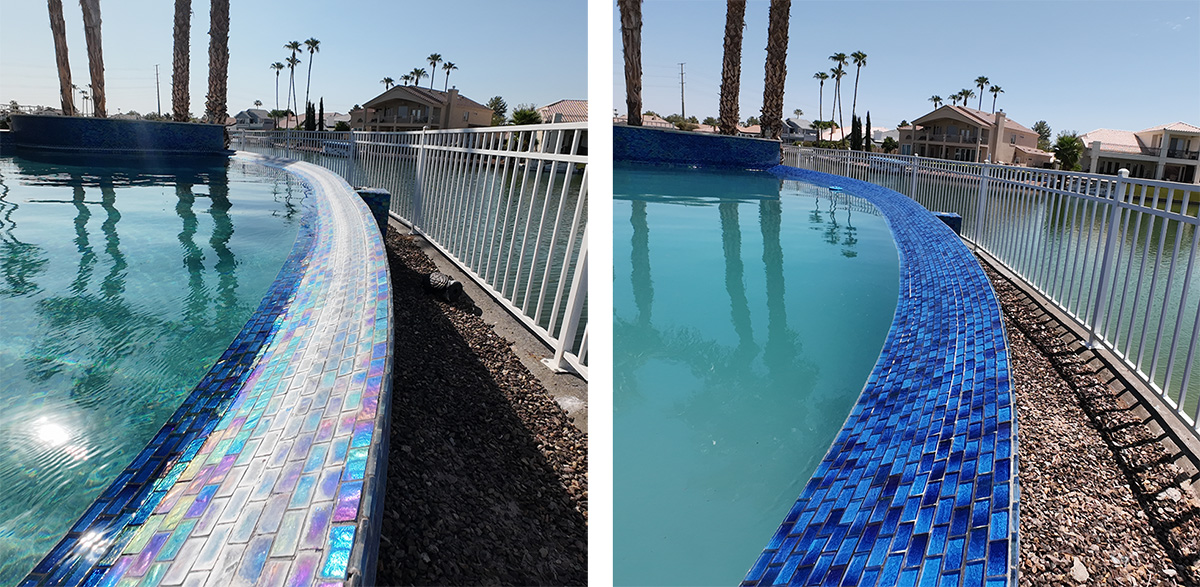Signs It's Time to Clean Your Pool Tile
Quick Answer: If you see white scale or hard water calcium buildup along your pool’s waterline, spillways or water features, it’s time for professional tile cleaning. Removing buildup early protects your tile, grout, and pool interior from lasting damage.
Why Clean Pool Tiles Matter
Pool tiles aren’t just decorative. They form a protective band around your pool’s waterline that shields the plaster from constant water movement and UV exposure. They also provide a smooth surface that makes cleaning easier and helps prevent algae from taking hold.
Over time, however, dissolved calcium and other minerals in pool water adhere to tile surfaces and form hard, chalky scale. This buildup dulls your pool’s appearance, and can trap dirt, minerals, and other contaminates which may leave unsightly stains. Routine tile cleaning keeps your pool looking inviting and clean, while preventing costly tile repairs later.
How Tile Buildup Happens
Pool tile buildup mainly occurs through evaporation. Every time water evaporates, it leaves behind dissolved minerals like calcium, magnesium, and silica. These minerals attach to the tile and gradually harden into thick deposits.
Other contributing factors include:
- High calcium hardness — Above 400 ppm accelerates scale formation
- Unbalanced pH or alkalinity — Makes minerals fall out of solution more easily
- Warm weather and heavy evaporation — Speeds the cycle of mineral buildup
- Dust, dirt, or contaminates — Get trapped on the waterline and bond to scale
Top Signs That It's Time to Get Your Pool Tile Cleaned
If you're uncertain as to when you should clean your swimming pool tiles, look for the following signs:
1. White, Chalky Buildup
White crust along the waterline is the most common and obvious sign your pool tiles need cleaning. This is calcium and silica scale — and it only gets worse and harder to remove over time.
It usually begins as a faint haze that brushes away, but it soon forms a thick crust that bonds to the tile surface. If left untreated, it can etch the tile glaze, discolor grout lines, and create sharp edges that can be sharp to swimmers. Addressing it early keeps the tile glaze and surface intact and much easier to maintain.

2. Colored Stains
Brown, orange, or green tile discoloration along the waterline usually means metal stains or algae are trapped in calcium deposits.
- Brown or orange stains often come from iron or copper in the water.
- Green or black streaks are usually algae growing on rough scale.
Once staining sets in, even strong chemicals may not lift it without first cleaning the underlying scale.
3. Dull or Cloudy Tile Appearance
Over time, tile that once looked bright and glossy can start to look dull, faded, or cloudy. This often happens when thin layers of calcium and other minerals build up on the surface.
At first, the film is nearly invisible, but it gradually masks the natural shine of your tiles and makes colors appear muted. This loss of visual appeal is one of the earliest clues that buildup is forming—even before thick scale lines appear. Professional cleaning removes the film and restores the tiles’ original sparkle.
4. Scale Feels Rough to the Touch
Another sign that it’s time to clean your pool tiles is if the waterline area feels rough or gritty instead of smooth when you run your hand across it.
This texture happens when dissolved minerals have hardened into early-stage scale deposits. While the roughness itself won’t damage the tiles, it does show that the buildup is getting thicker and more stubborn. Cleaning at this stage is much easier than waiting until the scale becomes rock-hard.
3. Cleaning No Longer Works
If scrubbing and scale removers don’t make a difference anymore, it means the deposits have hardened beyond what DIY methods can handle.
Trying to chip or scrape scale off yourself can crack the tile or scratch off its protective glaze. At this point, professional cleaning is the safest and most effective solution. Services like Bullfrog Pool Tile Cleaning use eco-friendly blasting methods that remove scale and stains without damaging the tile, grout, or glaze.

Why This Happens Faster in Arizona
Arizona pools build up scale faster than those in most other regions. The reasons are simple:
- Extremely hard water rich in calcium and minerals
- High heat and intense sun, which accelerate evaporation
- A year-round swimming season that gives buildup no downtime
What might take three or four years to develop in cooler climates can appear within one year in Phoenix. Many Arizona homeowners schedule professional tile cleaning every 1–2 years to keep the pool free of calcium buildup.
How Professional Pool Tile Cleaning Works
Professional cleaning safely removes hardened buildup without damaging your tile or grout. The process typically involves:
- Lowering the waterline to expose the tile
- Using compressed air with soft blasting media to remove calcium deposits, and never using damaging glass bead on pool tile
- Cleaning grout lines
- Rinsing and sealing the tile surface to slow future buildup
Most cleanings can be completed in a single day, and unlike DIY scraping or harsh chemical treatments, professional methods avoid cracking the tile or eroding grout.

How to Prevent Future Buildup
Once your tiles are clean, you can slow down future scale by:
- Maintaining calcium hardness at 200–400 ppm
- Keeping pH between 7.4–7.6 and alkalinity at 80–120 ppm
- Brushing the waterline weekly to disrupt early deposits
- Cleaning filters regularly to remove mineral content
- Using a pool cover to reduce evaporation when not in use
These steps won’t prevent scale forever, but they will extend the time between cleanings and protect your tile investment.













